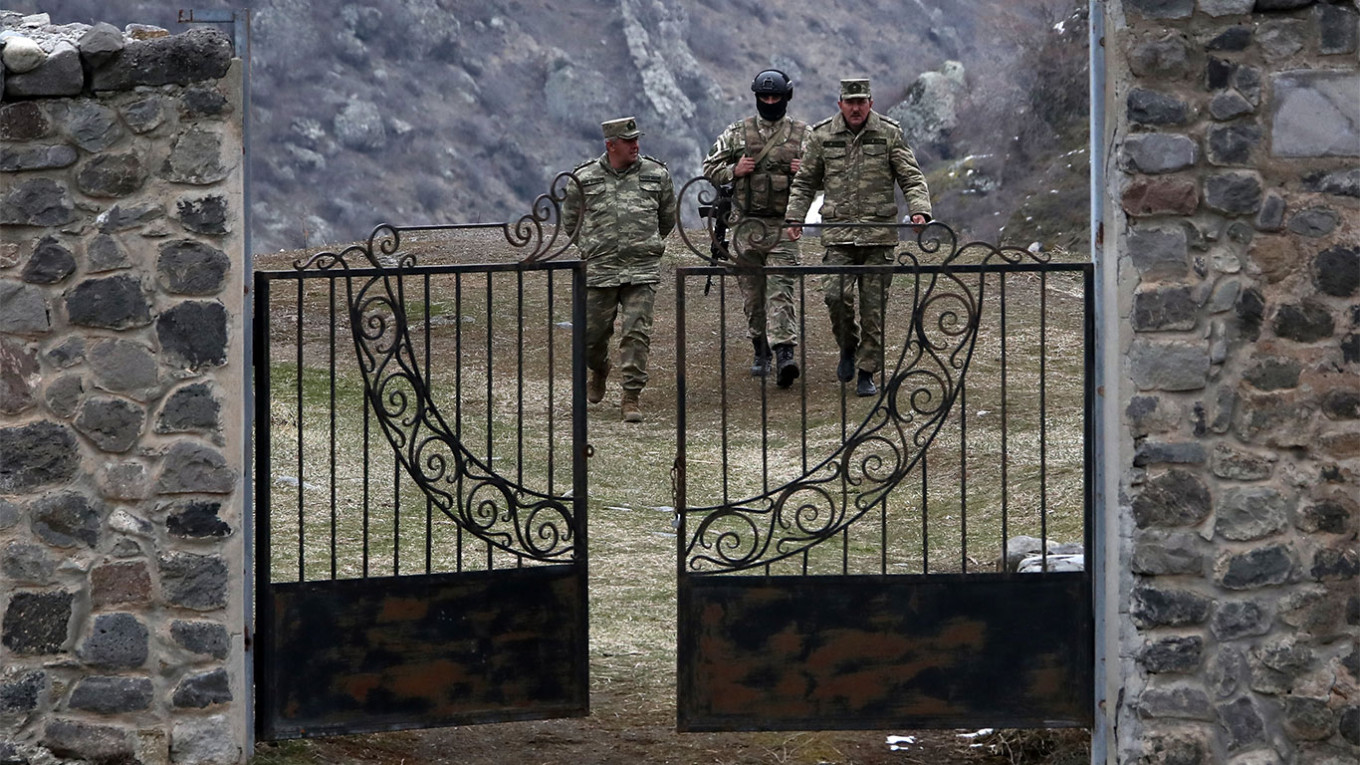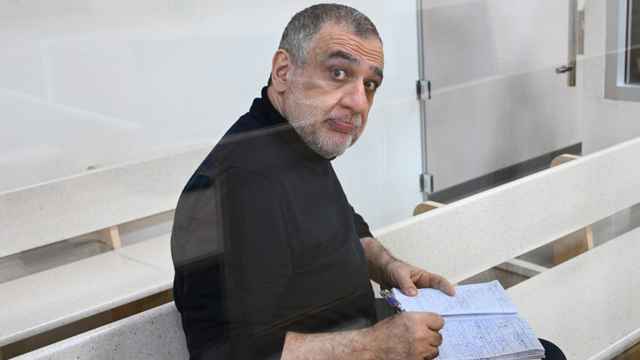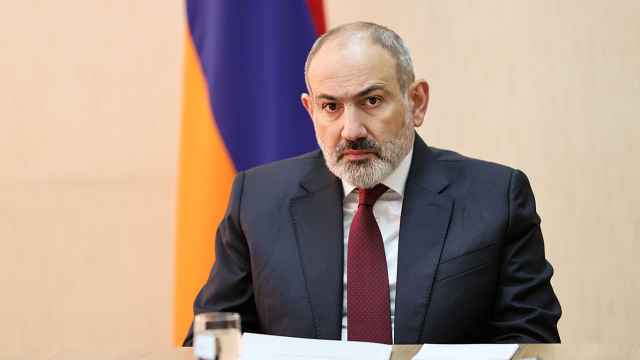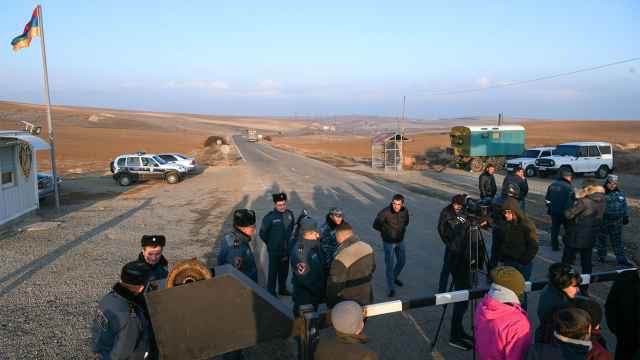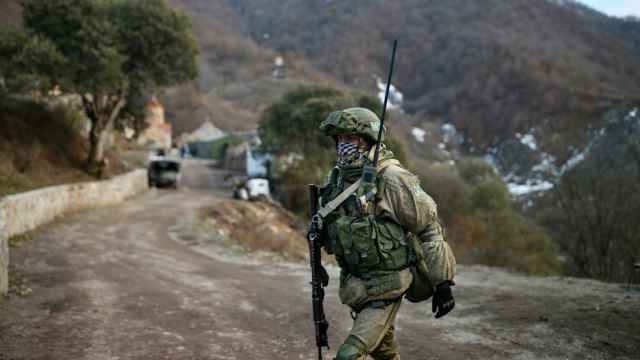Azerbaijan on Tuesday launched a military operation against the breakaway Nagorno-Karabakh region and demanded the total withdrawal of Armenian forces from the disputed mountainous territory as a precondition for peace.
Fears of a fresh war have been growing in recent months, with Armenia accusing Azerbaijan of a troop build-up and decrying a blockade of its only land link to Nagorno-Karabakh.
An AFP journalist in the separatist stronghold of Stepanakert said blasts could be heard in the town.
Another AFP contributor said he could hear "non-stop shelling," the sound of sirens and of a drone overhead.
Azerbaijan's defense ministry said it was using "high precision weapons on the front line and in depth."
"Localized anti-terrorist measures have been launched in the region," the defense ministry said in a statement.
The ministry said it had opened "humanitarian corridors and reception points" to allow civilians to leave.
Armenian separatists said two civilians were killed and 23 were wounded in the fighting, accusing Azerbaijani forces of "trying to advance" into Karabakh.
The ex-Soviet Caucasus rivals have been locked in a decades-long dispute over Karabakh with large-scale hostilities breaking out in the 1990s and in 2020.
Armenian Prime Minister Nikol Pashinyan said Azerbaijan had begun a "ground operation aimed at ethnic cleansing of Karabakh Armenians."
Pashinyan said the Armenian army was not involved in the fighting and the situation on the border between Armenia and Azerbaijan was "stable."
In televised comments, he urged Russia and the UN to "take steps."
Hundreds of people gathered outside the government building in the Armenian capital Yerevan, according to images shown on TV, following calls for a protest to urge the government to respond to the Azerbaijani operation.
"We must not allow certain people, certain forces to deal a blow to the Armenian state," Pashinyan said.
"There are already calls, coming from different places, to stage a coup in Armenia."
'Intensive fire'
Armenia's foreign ministry condemned Azerbaijani "aggression" against Karabakh.
"On September 19, Azerbaijan unleashed another large-scale aggression against the people of Nagorno-Karabakh, aiming to complete its policy of ethnic cleansing," the foreign ministry said.
It said Russian peacekeepers stationed in the region should "take clear and unequivocal steps to stop Azerbaijan's aggression."
A separatist organization based in Armenia said on social media that "Stepanakert and other cities and villages are under intensive fire," accusing Azerbaijan of launching a "large-scale military offensive."
Azerbaijan justified the mission, citing "systematic" shelling by Armenian-backed forces and accusing them of carrying out "reconnaissance activities" and fortifying defensive positions.
"There is also the strengthening of combat positions with personnel, armored vehicles, artillery and other weapons," Azerbaijan said, accusing separatists of "a high level of combat readiness."
Regional power brokers Russia and Turkey, which oversee a fragile peacekeeping mission in Nagorno-Karabakh, had been informed about Azerbaijan's military activities in Karabakh, Baku said.
Moscow urged the parties to the conflict to respect a peace accord and end the "bloodshed."
Russian Foreign Ministry spokeswoman Maria Zakharova said it was given "minutes" notice of the start of Azerbaijan's operation.
Kremlin spokesman Dmitry Peskov said Russia was "concerned" over the "sharp escalation" in Karabakh and was working to get the two countries to negotiate.
Mine blasts
The fighting came just hours after Azerbaijan said four police officers and two civilians were killed in mine blasts in Nagorno-Karabakh, with authorities blaming separatists.
The deaths at dawn came after Armenian separatists said they had reached an agreement with Azerbaijani authorities to resume aid deliveries to Karabakh.
Baku's security services said two civilians had died in the district of Khojavend and four police officers were killed in another mine explosion en route to the site.
Their vehicle hit "a mine laid on a tunnel road under construction by illegal Armenian armed groups," a statement said.
Azerbaijan said the incident took place "in the zone of temporary deployment of the Russian peacekeeping contingent," despatched by Moscow in 2020 as part of a ceasefire deal between Armenia and Azerbaijan.
Azerbaijan said the police officers were killed on the road to Azerbaijani-controlled Shusha, recaptured from separatists in 2020.
In the six-week 2020 war, Azerbaijan regained control of key areas of Karabakh, including the culturally revered town of Shusha.
But other parts of the region, including the main city of Stepanakert, remain under the control of Armenian separatists.
Azerbaijan said the road to Shusha was built after it captured pockets of land from Armenia in 2020.
"During the construction of the road, the area along the route was cleared of mines," Baku said.
Karabakh is heavily mined. Over the last three decades, hundreds of Azerbaijanis have been wounded or killed by landmines laid by Armenian forces.
Azerbaijan said Tuesday more than 300 of its nationals have been wounded or killed by mines since 2020.
Both Azerbaijani and Armenian militaries used them during a bloody conflict in the early 1990s.
Azerbaijani President Ilham Aliyev has said that landmines were the main obstacle impeding the return of displaced people to territories retaken from Armenian separatists in 2020.
A Message from The Moscow Times:
Dear readers,
We are facing unprecedented challenges. Russia's Prosecutor General's Office has designated The Moscow Times as an "undesirable" organization, criminalizing our work and putting our staff at risk of prosecution. This follows our earlier unjust labeling as a "foreign agent."
These actions are direct attempts to silence independent journalism in Russia. The authorities claim our work "discredits the decisions of the Russian leadership." We see things differently: we strive to provide accurate, unbiased reporting on Russia.
We, the journalists of The Moscow Times, refuse to be silenced. But to continue our work, we need your help.
Your support, no matter how small, makes a world of difference. If you can, please support us monthly starting from just $2. It's quick to set up, and every contribution makes a significant impact.
By supporting The Moscow Times, you're defending open, independent journalism in the face of repression. Thank you for standing with us.
Remind me later.


